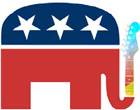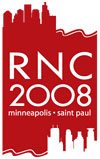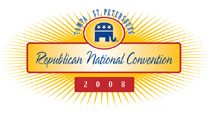Republicans considered four cities--Cleveland, Minneapolis-St. Paul, New York City, and Tampa-St. Petersburg. Their nine-person Site Selection Committee, consisting of two RNC members elected from each of four regions and co-chaired by RNC Co-Chair Jo Ann Davidson, voted in late September 2006 to recommend Minneapolis-St. Paul to host the 2008 Republican National Convention.
Democrats considered three
cities--Denver,
Minneapolis-St.
Paul, and New
York City (see photos)--until
the Republicans' choice of Minneapolis-St. Paul removed that possibility
leaving only Denver and New York City. A 10-person
Technical
Advisory Committee weighed the merits of the cities' proposals (this
is a contrast to the process in recent cycles where the site advisory committee
comprised 40 or more people). The DNC had expected to announce the
host city in late 2006, but deliberations dragged on as organized labor
raised concerns about Denver and New York leaders expressed reservations
about doing the necessary fundraising. Finally on January 11, 2007
the DNC announced its choice of Denver.
DEMOCRATS Recommended: 2008 Democratic Convention Watch blog
 |
|

[Dropped from consideration after RNC selected] |
| Nov. 4, 2005 | DNC Chairman Howard Dean announces that the Democrats will hold their 2008 national convention from Monday, August 25 through Thursday, August 28, 2008. According to the press release, "The late August convention date will allow the Democrats to host their convention after the 2008 Summer Olympics in Beijing." |
| Nov. 2005 | DNC sends out letters of invitation to 35 cities. |
| ...over the next three months eleven cities express intial interest. | |
| Feb. 27, 2006 | DNC mails out Request for Proposals (RFPs) to the 11 interested cities: Anaheim, Dallas, Denver, Detroit, Las Vegas, Minneapolis, New Orleans, New York City, Orlando, Phoenix and San Antonio. |
| May 19, 2006 | Deadline for cities to respond. Denver, Minneapolis-St. Paul and New York City submit proposals. New Orleans granted extension. |
| June 14-16, 2006 | Technical Advisory Committee visits New York City. |
| June 21-23, 2006 | Technical Advisory Committee visits Denver. |
| June 26-28, 2006 | Technical Advisory Committee visits Minneapolis-St. Paul. |
| Late June 2006 | New Orleans, which had been granted an extension, decides not to submit a proposal. |
| Jan. 11, 2007 | DNC announces selection of Denver as the host city for the 2008 Democratic National Convention. [press release] |
REPUBLICANS
 |
 |
|
 |
| Jan. 23, 2006 | RNC announces members of its Site Selection Committee responsible for making recommendations to the full RNC for the location of the 2008 Republican National Convention. |
| Feb. 14, 2006 | RNC presents requests for proposals to 31 cities to determine interest in hosting the party's 2008 national convention. [press release] |
| April 6, 2006 | RNC announces 2008 Republican National Convention to be held from Monday, September 1st through Thursday, September 4th. |
| April 11, 2006 | RNC holds "interested cities day" at a hotel in Washington, DC. Representatives from 11 cities meet with the Site Selection Committee and address any questions or concerns. |
| May 22, 2006 | The deadline for official convention bids. Four cities submit proposals: Cleveland, Minneapolis-St. Paul, New York City and Tampa-St. Petersburg. |
| June 14, 2006 | RNC announces that the Site Selection Committee will visit the four finalist cities. |
| Aug. 2006 | Site visits. (Tampa-St. Petersburg is August 20-22, 2006). |
| Sept. 27, 2006 | RNC announces that the "Site Selection Committee has voted to recommend Minneapolis-St. Paul to host the 2008 Republican National Convention, pending the successful negotiation of the Site City Agreement." [press release] |
| Jan. 2007 | Full RNC approves final selection of the host city at the party's annual Winter Meeting. |
See also Site
Selection 2000; 2004
Dems | 2004
Reps
| Copyright © 2006, 2007 Eric M. Appleman/Democracy in Action |
 |